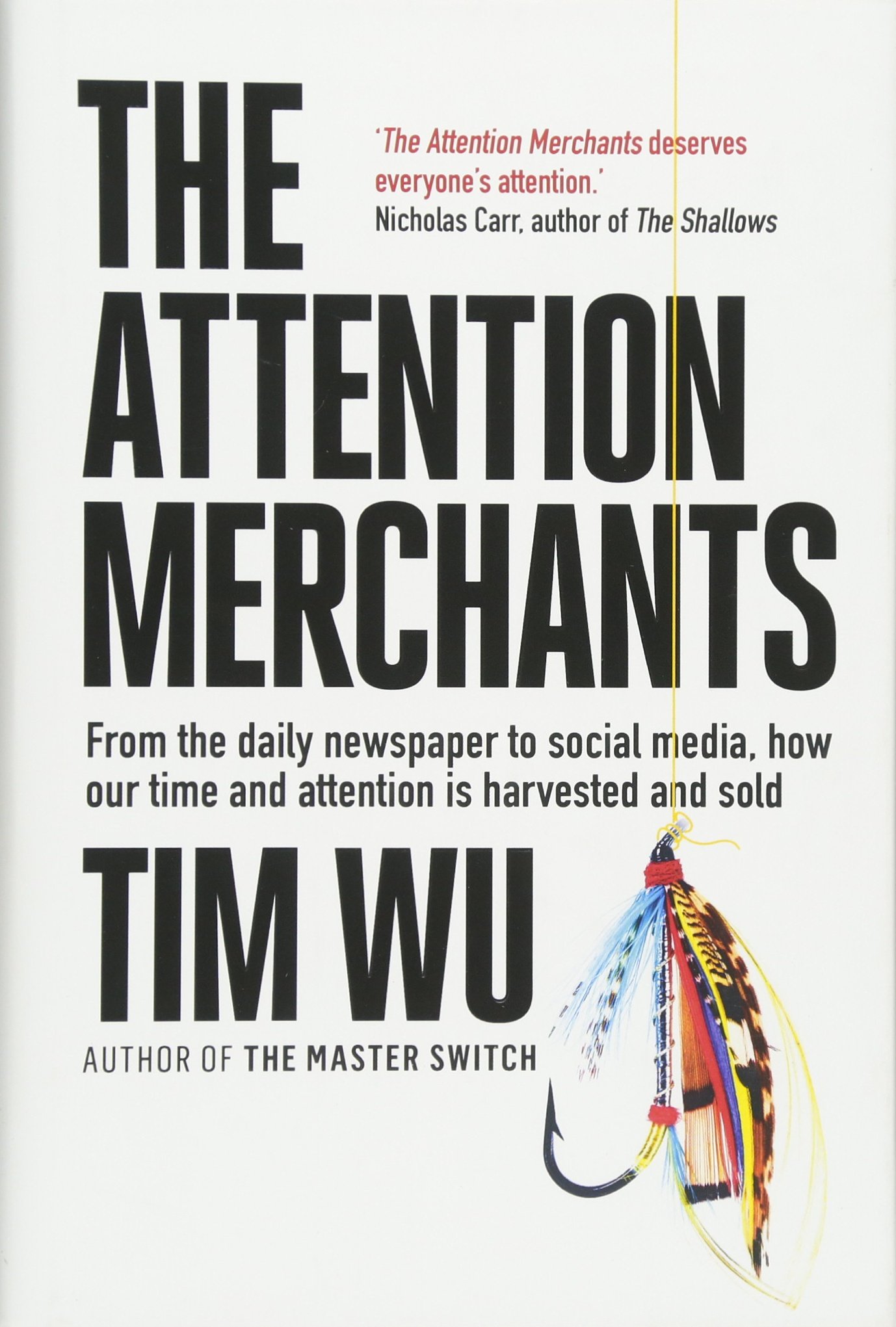Book Review – The Attention Merchants: how our time and attention are gathered and sold
Ivan Tyrrell reviews "The Attention Merchants: how our time and attention are gathered and sold" by Tim Wu (Atlantic Books, £20.00)
There was a time, not so long ago, when our homes, schools and social gatherings were sanctuaries sheltered from advertising and commerce. Over the last century, however, we have come to accept a different way of being, whereby nearly every bit of our lives is commercially exploited to the maximum extent that it can be. In this book, law professor Tim Wu brilliantly explains how this state of affairs arose and the ways in which attention merchants capture more and more of our waking moments for commercial or political gain, diminishing our humanity and potential for development in the process.
Neuroscientists estimate that our senses send up to 11 million bits of information a second into our brains. Fortunately, we are able to tune out most of it, otherwise we would be overwhelmed. Our minds have evolved the ability continually to focus and defocus attention and, instead, pay attention to whatever small amount of information it deems important for survival, entertaining or useful.
Elegantly written and full of stories that illustrate its theme, this book explores how this wonderful human ability – to filter out information – is also the source of a great vulnerability: although we have the capacity to ignore information, our brains are always paying attention to something. As Wu explains it, “If we think of attention as a resource, or even a kind of currency, we must allow that it is always, necessarily, being ‘spent’. There is no saving it for later. The question is always, what shall I pay attention to? Our brains answer this question with varying degrees of volition, from ‘shhh–I’m reading this’ to letting our mind wander in the direction of whatever might draw it in, whether in the corner of our screen or along some road we are walking. That is where the attention merchant makes his opportunity. But to succeed he must motivate us to withdraw our attention from where it is and surrender it to something else. It needn’t be a thoughtful calculation.”
Wu describes an attention merchant as an industrial-scale harvester of human attention, and who could deny that? In nearly every moment of our waking lives, we face a barrage of advertising enticements and branding efforts, from logos on our clothing and sponsored social media to commercials and other efforts to harvest our attention. Over the last century, few times or spaces have remained uncultivated by the attention merchants, as they thrust their ‘bargains’ and ‘deals’ at us, largely touting products we don’t actually need. We are being programmed to think we should buy instead of choosing to walk away from their offers.
All this contributes to the distracted, unfocused, dumbed-down tenor of our times. Wu argues that this is not simply the by-product of recent inventions but the end result of more than a century’s growth and expansion in the industries that feed on human attention, giving rise to the defining industries of our time, changing our nature – cognitive, social, and otherwise – in ways unimaginable even a generation ago.
In one brilliant paragraph, which warrants quoting in full, he issues a chilling warning. We have arrived at a state, he says, where, “At bottom, whether we acknowledge it or not, the attention merchants have come to play an important part in setting the course of our lives and consequently the future of the human race, insofar as that future will be nothing more than the running total of our individual mental states. Does that sound like exaggeration? It was William James, the great pragmatist philosopher, who, having lived and died before the flowering of the attention industry, held that our life experience would ultimately amount to whatever we had paid attention to.
“At stake, then, is something akin to how one’s life is lived. That, if nothing else, ought to compel a greater scrutiny of the countless bargains to which we routinely submit, and, even more important, lead us to consider the necessity, at times, of not dealing at all. If we desire a future that avoids the enslavement of the propaganda state as well as the narcosis of the consumer and celebrity culture, we must first acknowledge the preciousness of our attention and resolve not to part with it as cheaply or unthinkingly as we so often have. And then we must act, individually and collectively, to make our attention our own again, and so reclaim ownership of the very experience of living.”
I recommend this book unreservedly to all who are interested in innate human needs and resources.
IVAN TYRRELL is an experienced psychotherapist. He a director of Human Givens College, was a founding member of the European Therapy Studies Institute (ETSI) and co-developer of the human givens approach. He is a Fellow of the Human Givens Institute.
This review first appeared in the Human Givens Journal, Vol 24, No.1 – 2017
 Spread the word – – each issue of the Journal is jam-packed with thought-provoking articles, interviews, case histories, news, research findings, book reviews and more. The journal takes no advertising at all, in order to maintain its editorial independence.
Spread the word – – each issue of the Journal is jam-packed with thought-provoking articles, interviews, case histories, news, research findings, book reviews and more. The journal takes no advertising at all, in order to maintain its editorial independence.
To survive, however, it needs new readers and subscribers – if you find the articles, case histories and interviews on this website helpful, and would like to support the human givens approach – please take out a subscription or buy a back issue today.
Latest Tweets:
Tweets by humangivensLatest News:
HG practitioner participates in global congress
HG practitioner Felicity Jaffrey, who lives and works in Egypt, received the extraordinary honour of being invited to speak at Egypt’s hugely prestigious Global Congress on Population, Health and Human Development (PHDC24) in Cairo in October.
SCoPEd - latest update
The six SCoPEd partners have published their latest update on the important work currently underway with regards to the SCoPEd framework implementation, governance and impact assessment.
Date posted: 14/02/2024











